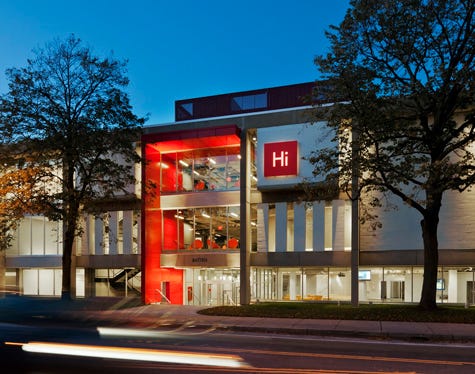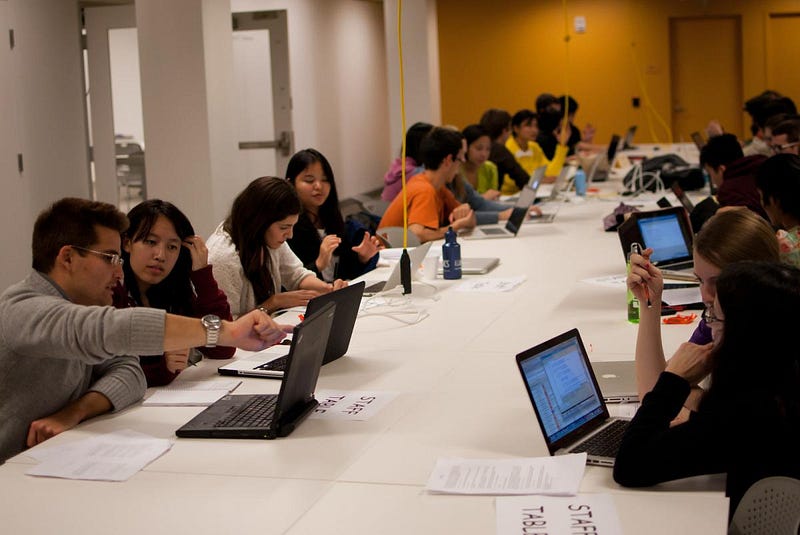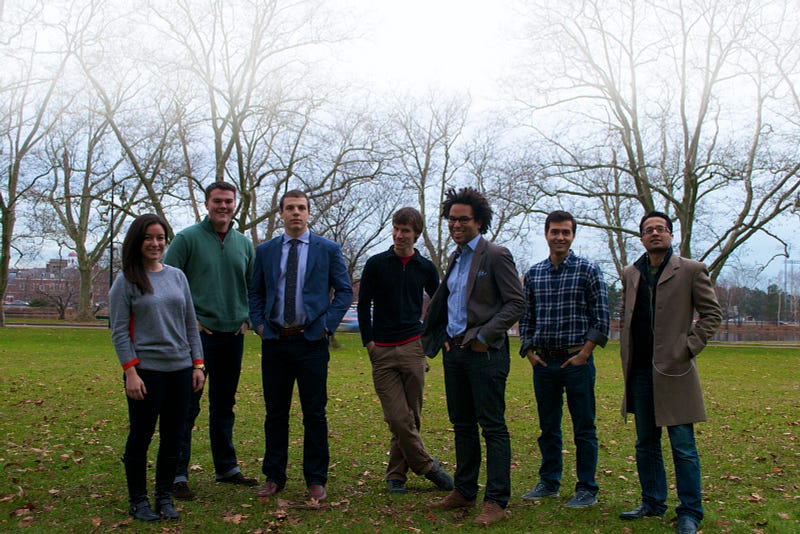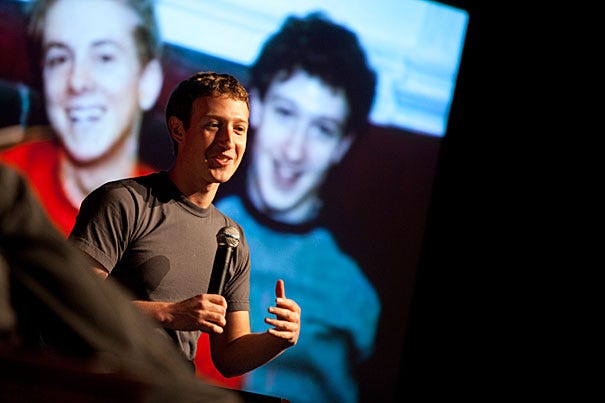
This post was originally published on Medium in 2013.
As I finish this semester, I thought it might be valuable to shed some light into the unique entrepreneurship scene at Harvard. It can be clichéd, but it’s hard to deny Bill Gates’s and Mark Zuckerberg’s Harvard roots. There’s increased interest in entrepreneurship on all college campuses, but at Harvard it has accelerated especially rapidly given The Social Network and the Facebook IPO. The startup scene has grown beyond recognition in the three years I’ve been on campus—I’m a junior now—so I’ll try to objectively describe the various initiatives around campus and then offer my own thoughts.
Harvard Innovation Lab
The largest addition to Harvard’s entrepreneurship efforts this year was the new Innovation Lab (i-lab for short). The 30,000-square-foot ground floor features day-use space, reserved space for incubated teams, a classroom, conference rooms, a kitchen stocked with snacks, and a game room filled with video games.

Physically, the building is on the Harvard Business School campus. While it isn’t next to the center of campus (Harvard Yard), the vast majority of entrepreneurship events are now hosted there, so many students have been spending more time there. The i-lab has hosted a startup career fair, a Startup Weekend hackathon, and office hours with venture capitalists and entrepreneurs-in-residence.

University-Sponsored Initiatives
Considering that the i-lab hosts or runs many of these initiatives, it makes sense to describe these next. The administration recently came out strongly in support of entrepreneurship, sponsoring a President’s Challenge that awarded 10 teams $5,000 each to advance their ventures in the areas of clear air, clean water, global health, personal health, and education. A panel of professors then awarded a grand-prize winner and up to three finalists a total of $100,000 to develop their ventures during the summer. While money isn’t the only solution to encouraging entrepreneurship, the resources and backing of the University certainly go a long way to helping student-led ventures.
The Experiment Fund
Probably the second most important announcement of the past term was the launch of the Experiment Fund, a seed fund run by NEA, Accel Partners, and Polaris Ventures to help fund student ventures. While the fund was initially launched at Harvard, it is expanding to include other colleges in Cambridge. The fund has already financed a few ventures, including health incubator Rock Health and TV-over-the-Internet startup Tivli.
Hack Harvard
The newest technical addition to startup extracurriculars is Hack Harvard, an organization that brings together mostly engineering students who are working on personal projects. An emphasis is placed on cool hacks or integration of third-party APIs. In the last year, they welcomed a number of technical speakers, among them Aza Raskin of Massive Health and former creative lead of Firefox. They also welcomed the Winklevoss twins and Divya Narendra of The Social Network fame.
Hack Harvard runs an incubator program over winter break for campus startups. Students learn more about web development and design through a number of workshops led by professors and upperclassmen. They spend the rest of their time advancing their projects in anticipation of a demo day for other students, investors, and the Boston community.
Rough Draft Ventures
Just a few months ago, General Catalyst helped launch a new seed-stage fund in Boston for students working on a startup of their own. Rough Draft Ventures gives students up to $25,000 in the form of an uncapped convertible note to fund their venture. Its first investment was $20,000 in Balbus Speech, a company focused on special education and speech therapy.

Zuck returns to campus
The biggest tech celebrity to come to campus in 2012 was Mark Zuckerberg, who returned for the first time since dropping out in 2004. His homecoming was billed as a recruiting talk, and he spoke to an audience of computer science students. Overall, his visit further invigorated campus interest in computer science.

Computer Science Department
The most notable addition to the Harvard CS program was Computer Science 164: Mobile Software Engineering. The class is not only an introduction to iOS programming and jQuery Mobile, but also a great primer in industry-standard software development practices, including pair programming, code reviews, source control, unit testing, MVC frameworks, and database scaling. The class is taught by star CS professor David Malan, who also teaches the introductory CS class, CS 50. CS 50, a 10-week overview of computer science in C, HTML, CSS, Javascript, PHP, MySQL, is now the second most enrolled class at the College following Introduction to Economics, demonstrating the surging popularity of CS at Harvard.
Social Entrepreneurship
The entrepreneurship scene isn’t limited to tech startups. Students are interested in social entrepreneurship across a number of areas, including education, health, clean tech, and more. Through extracurriculars like the Social Innovation Collaborative and University initiatives like the President’s Challenge, there is an emphasis on socially-oriented ventures.
Business Plan Competition Winners
There are two main business plan competitions on campus. College students enter the i3 competition, while HBS students enter the HBS Business Plan competition. Past winners of the HBS competition include Rent The Runway, Birchbox, CloudFlare, RelayRides, and thredUP. In 2012, the winner of the business venture track was Vaxess Technologies, a company working to commercialize a technology to condense vaccines into a thin film strip that can be shipped and stored without refrigeration. Here’s a full list of the winners and runners-up.
On the college level, a total of $50,000 was awarded to six major award winners for everything from a foot shape analysis technology to an iPad point-of-sale survey platform. Here’s the full list of winners.
Harvard College Venture Partners
There is also a strong interest in venture capital on campus, the main activity for which is Harvard College Venture Partners, or HCVP. HCVP brings venture capitalists and successful entrepreneurs to campus to speak with Harvard startup founders. One of its main objectives is to facilitate cross-campus collaboration, particularly with Harvard Business School students and professors.
HBS
Harvard Business School has become notably more open to sharing its resources with the rest of the University. The i-lab is one way of connecting HBS professors with undergrads and other schools. A new class taught to undergrads this year was U.S. and the World 36: Innovation and Entrepreneurship. The class—a survey on innovation across disciplines—was taught with HBS’s signature case study method. It was primarily taught by professors Joe Lassiter and Mihir Desai and co-taught by visiting professors from other Harvard schools, including the Kennedy School of Government and Engineering School. The course culminated with students working on over 40 real-world projects at various startups and organizations.
Harvard Business School students have also increasingly turned to the College to learn about CS. Enrollment in CS50 by HBS students was sharply up this past fall. Many students were happy with their decision to take it, and the increased interaction with undergrads was largely welcome (though I don’t believe many undergrads have bandwidth to work on outside projects, which I describe more below).
This shift towards openness was both student- and faculty-driven. The new FIELD curriculum requires that all ~900 first-year students conceive, establish, and grow a business using $5,000 in seed money from HBS. This broad shift in the first-year curriculum followed the success of Startup Tribe, HBS’s homegrown entrepreneurship club founded just two years ago. As I understand it, entrepreneurship among the HBS student body was previously an afterthought, something only a small percentage of students did. Startup Tribe helped change the entrepreneurship scene on campus, so much so that its founders recently received the Dean’s Award for their efforts.
HLS and the Harvard Law Entrepreneurship Project
Further demonstrating how Harvard’s graduate schools are now collaborating, the Harvard Law Entrepreneurship Project (HLEP) helps student startups avoid common legal pitfalls and critically assess the viability of their businesses. Each semester, after a pitching and vetting process, the Student Practice Organization pairs law student teams and an attorney advisor from Cooley, Gunderson Dettmer, or WilmerHale with ten to twelve student entrepreneur teams. All projects are also reviewed by the current General Counsel of Charles River Ventures. HLEP has worked with entrepreneurs from virtually every school at Harvard so far. Recently, HLEP’s leadership organized Hack IP, a weekend-long event dedicated to brainstorming and developing a policy about copyright that HarvardX should adopt.
i-lab Silicon Valley Trek
Another effort to raise interest in entrepreneurship as a career choice was the Innovation Lab’s trek to Silicon Valley. About 40 students, evenly split between HBS students and undergrads, Graduate School of Education, Kennedy School, and engineering graduate students, visited Silicon Valley VCs, startups, and incubators.
We heard from Michael Dearing at Harrison Metal; serial entrepreneur Mike Cassidy; Randy Komisar from Kleiner Perkins; Matthew Prince at Cloudflare; James Reinhart at thredUP; Diego Rodriguez at IDEO; and many more.
Incidentally, Cloudflare was founded on that same trip in 2009, when founders Matt Prince and Michelle Zatlyn developed the idea in the hotel bar in between trips to startups. Having that in mind as we visited Harvard alumni across the Valley was even more inspiring. From my understanding, the general consensus from students on the trip was that they were newly inspired and driven to get a career at a startup after graduating.
Here’s a short video chronicling our trip.
Recruiting
There is no shortage of startup opportunities for students, but it can be hard to sort out the good opportunities from the bad. The main recruiting mailing lists get 5-10 emails a day with startup opportunities. Here are a few excerpts of a few of the more interesting requests.
We are looking for a technical co-founder who can build and design all aspects of the website, including creating an attractive product and managing the back-end database. The programmer should know (or be willing and able to learn quickly) PHP, HTML, CSS, JavaScript, and MySQL at a minimum. Familiarity with jQuery would be beneficial. The programmer should be able to essentially replicate Pinterest, or be confident that they can learn how to do so in a short period of time. Please provide any examples of previous work, if any. Our engineer will be an equity partner in what we believe will be a very profitable business and great learning opportunity. We are also open to discussing salaried compensation instead of equity. The co-founder will join a team with experiences ranging from entrepreneurship, design, consulting, and law, and will learn about the contacts and skills necessary to start a new venture.
and
I have a project which I need your assistance on. What am I offering? A partnership. I have a concept which I believe is worth pursuing. It most likely will involve php, sql, and rss. The first step would be letting me know if you are interested or not (I know some of you are very busy). The second step would be a non-disclosure agreement. I would then explain the concept, and you could tell me if you are interested in helping develop it. You would then tell me what percentage ownership in the company you would be seeking. I would then see which offer is a match between ownership and skills and select. You pick your own team. We will make it work. I look foward to hearing from you.
On the other hand, we also get a number of recruiting requests from exciting, well-funded San Francisco, New York, and Boston startups looking for students to fill internship and full-time positions.
If you’re interested in recruiting Harvard students, there are two main outlets to do so. First, contact the Office of Career Services. They’re the official middleman between employers and students, and they’re incredibly committed to increasing the number of students who go into the startup world after graduation. They can help get your job posting submitted into the Harvard job posting database, and will be able to tell you what career fairs are coming up. Second, submit your posting to [email protected]. Most CS students are subscribed to that list, run by the Harvard Computer Society, so it’s a good way to find qualified CS students.
Thoughts
In my opinion, Harvard’s startup scene is a microcosm of the broader startup environment: There’s a lot of noise, but there are many gems in the rough that will be hugely successful.
 zmh.org
zmh.org



